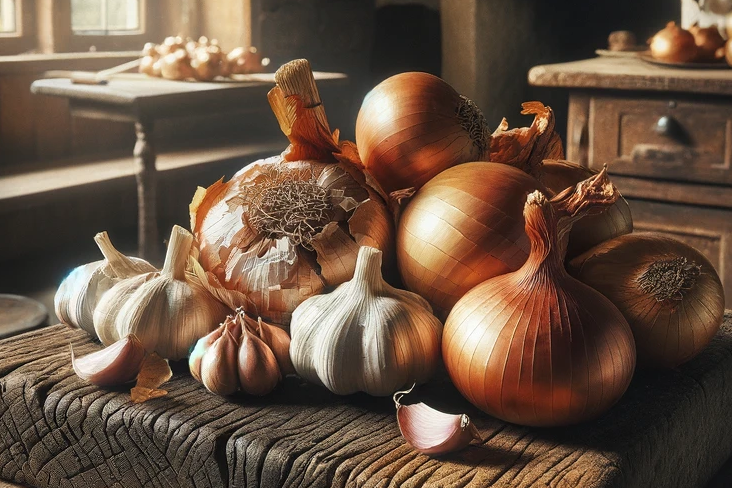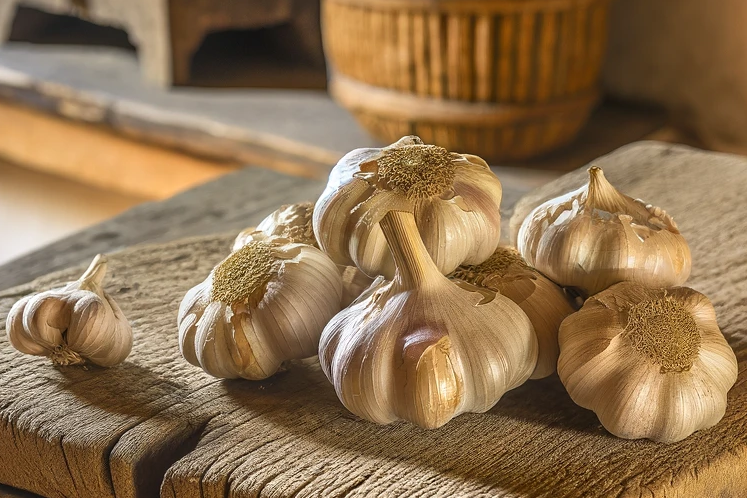Allyl sulfide

What is allyl sulphide?
Allyl sulphide is a volatile substance that is mainly found in garlic and in smaller quantities in onions. It is one of the main reasons for the distinctive smell and taste of these kitchen ingredients. But allyl sulphide is not just a flavor carrier; it also has a number of properties that bring potential health benefits and disadvantages for dogs.
On the bright side: potential benefits of allyl sulphide
Natural protective shield
Allyl sulfide exhibits antioxidant properties that can help strengthen the immune system. It helps to neutralize free radicals and thus supports the body in the fight against infections and diseases.
Heart health
In humans, research has shown that allyl sulfide may have positive effects on the cardiovascular system, including lowering blood pressure and promoting healthy arterial function. Although specific studies in dogs are lacking, it is possible that similar health benefits exist.
Anticancer perspectives
Some studies suggest that allyl sulfide may play a role in preventing and fighting cancer cells. Due to its ability to inhibit cell proliferation, it offers an interesting starting point for further research in the field of veterinary medicine.
On the dark side: the risks of allyl sulphide
Toxicity in dogs
Allyl sulphide can be toxic to dogs in large quantities and lead to oxidation of the red blood cells, which can result in anemia. Symptoms of such poisoning include lethargy, loss of appetite and, in severe cases, respiratory distress.
Gastrointestinal irritation
The ingestion of allyl sulfide can lead to vomiting, diarrhea and other gastrointestinal disorders in dogs. These symptoms occur particularly after eating large quantities of garlic or onions.
Long-term effects
Continuous intake of allyl sulfide in high doses can lead to permanent health damage, including problems with the liver and kidneys. It is therefore important to carefully monitor the intake of this substance.
Allyl sulfide is a prime example of the complexity of the relationship between food ingredients and dog health. While there are potential health benefits, balance is key, as the risks of overdose can be serious. Dog owners should therefore be cautious and avoid garlic and onions - the main sources of allyl sulphide - in their dogs' diets or only use them in very small, safe amounts. Your dog's health and welfare should always be paramount, and sometimes this means avoiding certain foods altogether or only giving them under veterinary supervision.
Properties 5
Are you looking for other ingredients with a specific property?
Just click on them to find more.
If you notice any signs of hypersensitivity or poisoning in your dog, you should see your vet immediately. We are not a substitute for a vet, but we try to be as accurate as possible. Every dog reacts differently and we recommend you get a second opinion or consult your vet if in doubt.
Stay healthy and take good care of your four-legged friend!😊
Similar to Allyl sulfide
Diallyl disulphide is an organic sulphur compound that is mainly found in garlic and in smaller quantities in onions. It is responsible for the characteristic smell and taste of these vegetables....
Allyl methyl trisulphide belongs to the group of organic sulphur compounds and is mainly found in garlic and onions. It is responsible for some of the characteristic smells and tastes of these...
Diallyl trisulphide is a chemical compound that, like diallyl disulphide, is found in certain plants such as garlic and onions. It is an organic sulphur compound and plays a role in the...
Dipropyl disulphide belongs to the class of organic sulphur compounds and is found in nature in numerous plants and some animal products. It is known for its distinctive smell and is often used as a...



